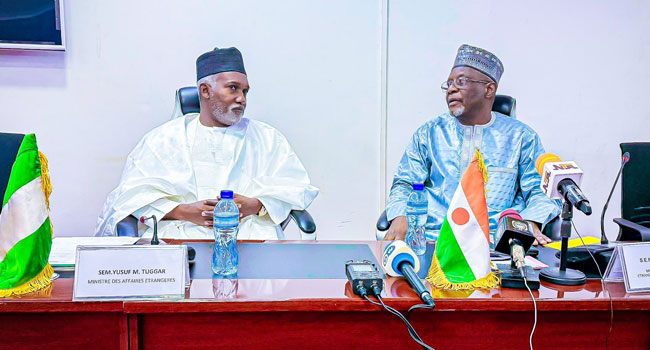n a renewed effort to thaw strained relations with its northern neighbor, the Federal Government of Nigeria has initiated a high-level diplomatic mission to the Republic of Niger. Nigeria’s Minister of Foreign Affairs, Yusuf Tuggar, led a delegation on a working visit to the capital city, Niamey, on Wednesday, signaling a potential shift toward reconciliation after months of tension.
Tuggar was received by Niger’s Foreign Minister, Bakary Sangaré, with discussions centering on the restoration of trust, regional peace, and cooperation across critical sectors.
“Rebuilding trust and fostering regional stability remain central to Nigeria’s diplomatic efforts,” Tuggar stated via his official handle on X. “I led a delegation to the Republic of Niger to renew bilateral ties and strengthen cooperation in key areas such as security, trade, and energy.”
Beyond economic and security concerns, the talks also tackled shared challenges such as desertification, irregular migration, and the revival of the Nigeria-Niger Joint Commission (NNJC)—a platform once central to bilateral collaboration between both countries.
Background: Coup Fallout and Diplomatic Breakdown
Relations between Nigeria and Niger hit a historic low following the July 2023 military coup in Niger that toppled President Mohamed Bazoum. The swift reaction from the Economic Community of West African States (ECOWAS)—then chaired by Nigerian President Bola Tinubu—led to harsh sanctions and the threat of military intervention if constitutional rule was not restored.
Niger, under military rule, denounced what it perceived as external interference. The resulting diplomatic rift led to the closure of borders, suspension of joint development initiatives, and a breakdown in trust between Abuja and Niamey.
In a further escalation, Niger joined forces with Mali and Burkina Faso to form the Alliance of Sahel States (AES)—a breakaway bloc distancing itself from ECOWAS. Just last month, AES imposed a 0.5% import levy on goods from former ECOWAS members, including Nigeria, intensifying trade barriers and signaling a shift in regional alliances.
New Path Toward Regional Stability
Despite these tensions, Tuggar’s visit represents a significant step toward diplomatic de-escalation. Analysts suggest the move aligns with Nigeria’s broader strategy to stabilize its northern borders and reassert influence in the Sahel—especially as the region faces rising insurgency threats, worsening climate impacts, and growing geopolitical interest from global powers like Russia and China.
“Nigeria understands that isolated sanctions cannot substitute long-term stability,” a senior West African analyst told us. “They need engagement, and this visit signals an acknowledgment that the region’s future depends on cooperation—even if that means dealing with military regimes for now.”
Tuggar affirmed that both nations remain committed to peace, stability, and development in the West African sub-region. Whether this marks a full diplomatic reset remains to be seen, but the door to dialogue is now open.










